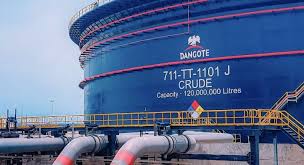The Independent Petroleum Marketers Association of Nigeria (IPMAN) has said the Dangote Petroleum Refinery should reduce the pump price of Premium Motor Spirit (PMS), commonly known as petrol, below its current level of N815–N825 per litre.
Speaking in an interview, IPMAN’s National Publicity Secretary, Mr. Chinedu Ukadike, argued that the refinery enjoys significant advantages—including access to crude oil in naira—that should translate into cheaper fuel for Nigerians. He stated that, in his estimation, petrol should be selling for about N750 per litre.
This comment came in response to recent remarks by the President of Dangote Group, Alhaji Aliko Dangote, who claimed that Nigerians now pay only about 55% of what other West African nations pay for petrol, largely due to the operations of his refinery.
While acknowledging Dangote’s claim, Ukadike pointed out that most of the countries used for comparison do not produce crude oil or refine it locally in their national currencies.
“I agree that petrol is cheaper in Nigeria than in other West African countries. But we are a crude oil-producing country, and Dangote is buying crude in naira. So, the forex burden is reduced. That should make the product cheaper here,” Ukadike said.
He stressed that Dangote’s refinery has effectively addressed the issue of scarcity by making petrol consistently available, thereby eliminating the long queues that plagued filling stations in the past. However, he maintained that the cost of petrol remains high, despite the advantages the refinery enjoys.
“In terms of availability, Dangote has succeeded. But in terms of pricing, we’re not there yet. With the right forex environment and strengthened naira, petrol should cost less,” he said.
Ukadike estimated that the ex-depot cost of petrol, considering production and distribution within Nigeria, should bring the retail price to around N750–N780 per litre. He said the current high price is largely driven by the naira-to-dollar exchange rate, which hovers around N1,600 to the dollar.
“If the dollar drops to about N1,100 or N1,200, I can assure you that petrol could sell for below N750 per litre,” he added.
Meanwhile, Alhaji Dangote, during a visit by the President of the ECOWAS Commission, Dr Omar Touray, and other officials to the refinery last week, reiterated that his facility had helped cut fuel prices across Nigeria. He noted that while other countries in the sub-region pay an average of N1,600 per litre, his refinery sells petrol locally for between N815 and N820.
According to Dangote, “The average price in neighbouring countries is around $1 per litre, which is N1,600. Nigerians are paying 55% of that price, thanks to local refining.”
He added that the naira-for-crude deal with the Federal Government helped to reduce prices and ease foreign exchange pressure, contributing to the refinery’s pricing model.
Also speaking during President Bola Tinubu’s recent visit to the 650,000 barrels-per-day facility in Lekki, Dangote said the effect of the refinery was already being felt across industries, especially after the sharp drop in diesel prices—from N1,700 to as low as N1,100 per litre. He said the diesel price cut had brought relief to the mining, industrial, and agricultural sectors.
However, despite these achievements, some industry experts and market observers, including a recent report by S&P Global, have noted that the refinery’s current prices for petrol and diesel remain relatively high when compared with global crude oil prices, which have been falling in recent months.
The Federal Government has remained supportive of the Dangote refinery, especially through the crude-for-naira policy, as part of its broader economic and energy reform strategy under the Renewed Hope Agenda.
At the time of this report, the Dangote Group’s spokesperson, Mr. Tony Chiejina, had not responded to IPMAN’s pricing concerns.
As Nigeria continues its journey towards energy self-sufficiency, the question of affordability and fair pricing will remain central to public debate. While availability has improved, pressure is now mounting on refiners and the government to ensure that local production leads to significantly lower fuel prices at the pump.
